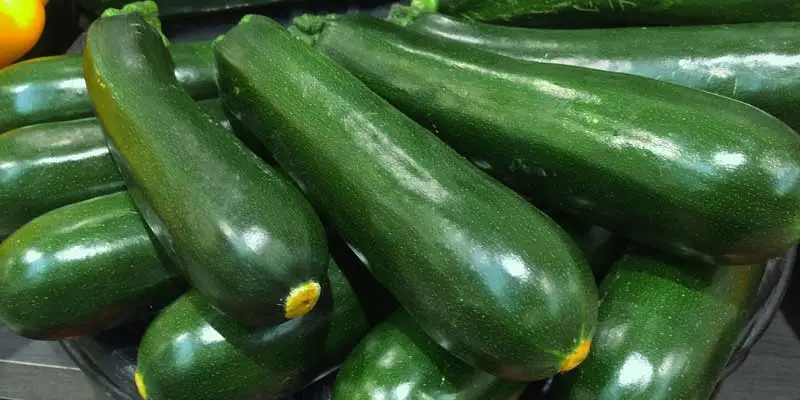Pass AI
Many people enjoy incorporating the versatile and nutritious vegetable, zucchini into their meals. Knowing the crucial aspect of maintaining its freshness and flavor–the duration for which refrigeration can preserve it effectively–is a necessity whether you use it in salads, stir-fries or baked dishes. This article explores various factors that influence zucchini’s shelf life; offers storage tips to extend its freshness; and delineates indicators of deteriorated quality in your zucchini.
Factors Influencing Zucchini Shelf Life:
1. Freshness at Purchase:
When purchasing zucchini, its freshness at the time of acquisition constitutes the primary factor influencing longevity. Opt for zucchini boasting vibrant green skin; a firm, unyielding texture; and an absence of visible blemishes. Indeed: freshly harvested varieties often outlast their older counterparts due to superior quality.
2. Storage Conditions:
To preserve the freshness of zucchini, one must key in on proper storage: this vegetable is highly sensitive to temperature and humidity. Indeed, refrigeration is essential; however–a crucial detail often overlooked–the location within your fridge where you store it can significantly impact its longevity. Preferably, store zucchini in a perforated plastic bag within the crisper drawer to maintain higher humidity levels; this ensures the vegetable doesn’t dry out.
3. Temperature:
Cold temperatures sensitize zucchini, necessitating refrigeration; however, one must avoid exposing it to sub-32°F (0°C) conditions. Chilling injury can afflict zucchinis–a susceptibility that cultivates dark spots and decay. For optimal zucchini storage, aim to maintain a temperature of 35°F to 40°F (1.6°C to 4.4°C) in your fridge.
4. Moisture:
Ensure you dry the zucchini before refrigerating to mitigate potential mold growth and spoilage caused by excess moisture. If you choose to wash it prior to storing, exercise care in patting it dry with a paper towel.
5. Cut or Whole Zucchini:
Generally, whole zucchinis exhibit a longer shelf life compared to their cut counterparts. The moment you slice a zucchini, its exposure to air and moisture increases; consequently reducing its overall shelf life. Ensure that you store any leftover sliced zucchini in an airtight container within the fridge.
Storage Tips to Extend Zucchini Freshness:
1. Refrigerate Promptly:
Promptly refrigerate zucchini after purchasing or harvesting to decelerate its aging process. A rapid decline in quality may occur if left at room temperature for an extended period.
2. Use Perforated Plastic Bags:
To maintain the optimal humidity level, place your zucchini in either perforated plastic bags or – if those are not available – simply poke a few holes in a regular plastic bag; this will achieve an equivalent effect.
3. Avoid Stacking:
To prevent bruising and accelerate spoilage, one should avoid stacking zucchinis atop each other in the fridge; this practice can also increase their moisture content.
4. Store Whole Zucchinis:
Whenever feasible, opt to store whole zucchinis instead of cutting them: this practice actively preserves their natural protective layer–an action that significantly prolongs freshness.
5. Check and Rotate:
Regularly inspect your zucchinis for any signs of spoilage; moreover, rotate them in the fridge–this will guarantee their consistent exposure to a cool and humid environment.
Signs of Spoilage:
1. Softness:
The touch should detect a firmness in fresh zucchini. However, if its texture transforms into softness or mushiness, it signals the onset of spoiling; indeed, this is an indication that the zucchini has started to deteriorate.
2. Wrinkling:
The zucchini’s dehydration and aging become evident through its wrinkled or shriveled skin.
3. Discoloration:
Signs of decay or mold growth manifest as dark spots or an overall skin discoloration.
4. Unpleasant Odor:
If you detect a foul or off-putting smell, it clearly indicates that the zucchini has spoiled.
Conclusion:
Concluding, various factors such as zucchini’s freshness at purchase, storage conditions—temperature and moisture levels in particular—and whether it remains whole or is cut; determine its shelf life in the fridge. If one follows proper storage practices while remaining vigilant for signs of spoilage: a prolonged period filled with fresh zucchini can be enjoyed. Integrate these tips into your routine—notably enhancing both flavor and nutritional benefits of favorite dishes with zucchinis will become possible. The next time you bring home this green delight, treat it meticulously; in turn, it promises to reward you with days’ worth of delectable meals.

Kate has been in the food business for over 20 years. Worked as a cook at several buffets which include Old Country Buffet, Five Star Buffet, and Ichiban Buffet. Now, I’m mostly at home cooking for my family, caring for chickens and ducks, and tending the garden.

